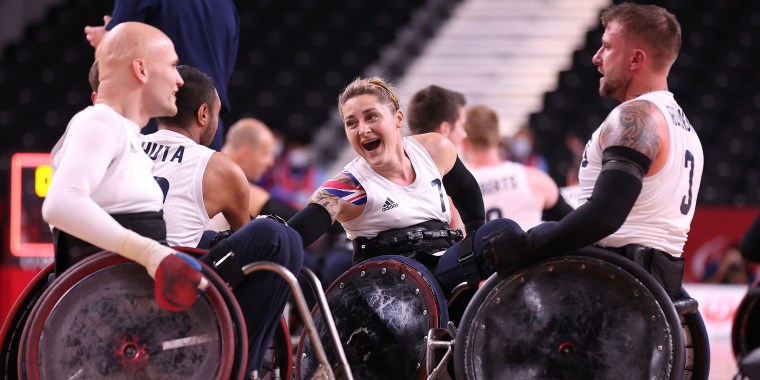Great Britain’s wheelchair rugby team made history on Sunday, defeating the United States 54-49 at the Tokyo Paralympics. The result marks Great Britain’s first ever medal in the sport.
With the win, one member of the British team also accomplished a notable feat: Kylie Grimes became the first woman to win gold wheelchair rugby. To put this in perspective: following Sunday’s victory, a total of 57 athletes (56 men and one woman) have won Paralympic gold in wheelchair rugby, a sport that made its official debut at the 2000 Sydney Games.
“Wheelchair rugby is for all of us – young girls, young boys, youth, everybody,” Grimes said after winning gold. “I would love to get more women involved in the sport. The more the merrier, I’d be delighted.”
While wheelchair rugby is a mixed gender sport, only four of the eight teams in Tokyo included a woman on their roster. And those four women actually broke the record for most women to compete in the sport at a single Paralympics:
- Kurahashi Kae (Japan)
- Kylie Grimes (Great Britain)
- Sofie Sejer Skoubo (Denmark)
- Shae Graham (Australia)
Grimes was the only returning Paralympian of the group. After making her wheelchair rugby debut at the 2012 London Games, she took a detour to track & field in 2016.
“It was always my dream to come back,” the 33-year-old said earlier this week. “I was always at home with the boys, at home with the rugby and that’s where I should have been. Back then at the time, there wasn’t really a line for me, there wasn’t really much going on and I wanted to try an individual sport and see where I could get.”
Like other Paralympic sports, wheelchair rugby uses a classification process to help ensure that winning is determined by skill and fitness, rather than degree of disability. Wheelchair rugby players are classified on a scale from 0.5 to 3.5, depending on the severity of their disability. Four players from each team are allowed on the court at a time, but the sum of their classification points can’t exceed eight. However, when at least one player on the court is a woman, that team is allowed up to 8.5 points. In other words, women essentially have 0.5 points deducted from their classification score.
Grimes isn’t the only woman to leave the Tokyo Paralympics with a wheelchair rugby medal. Kurahashi Kae (Japan) and Shae Graham (Australia) competed in the bronze medal match, with Japan claiming the victory. Both Kurahashi and Graham saw about six minutes of playing time.
Entering the Tokyo Paralympics, only one woman had won a medal in the sport: Canada’s Erika Schmutz, who claimed bronze at the 2008 Beijing Games.
This story first appeared on NBCSports.com.
